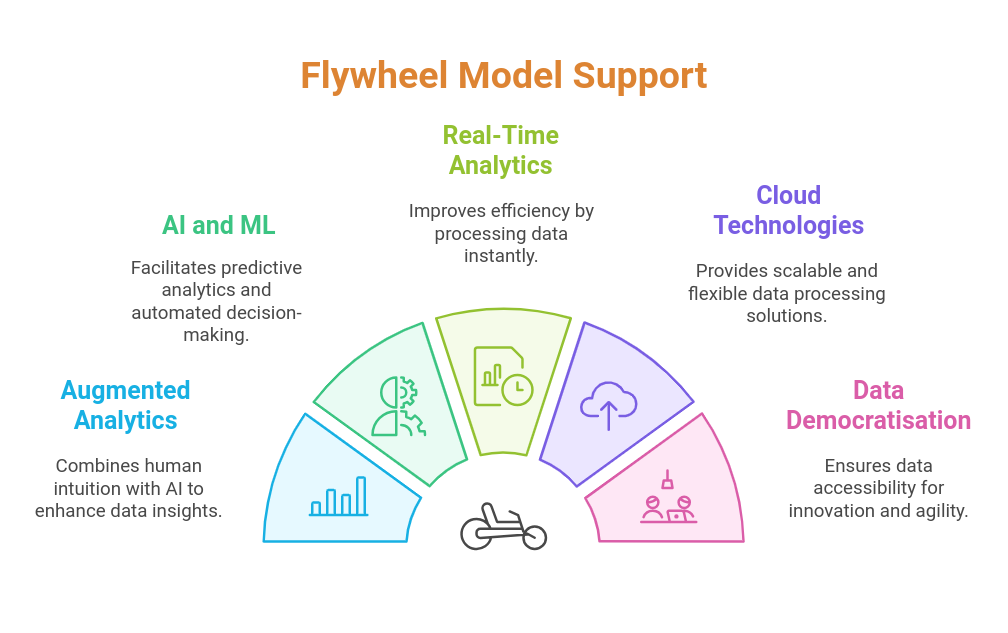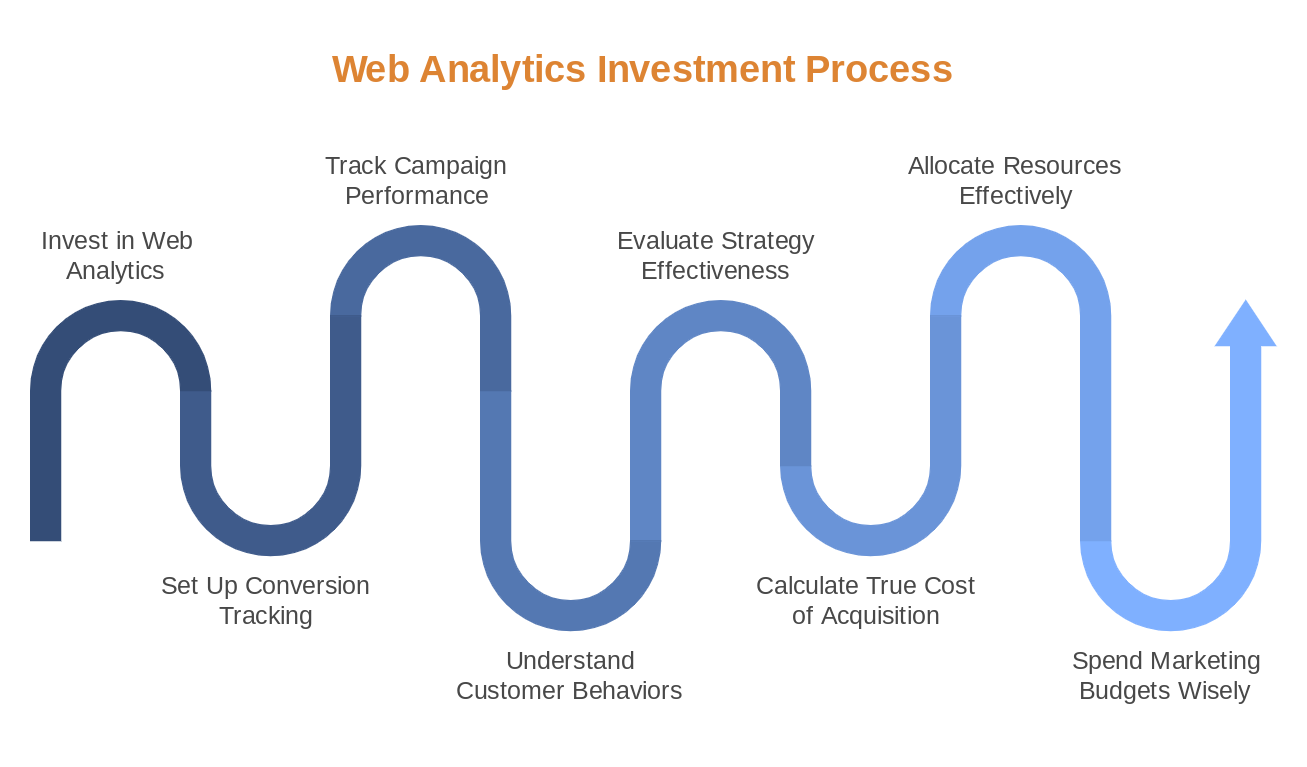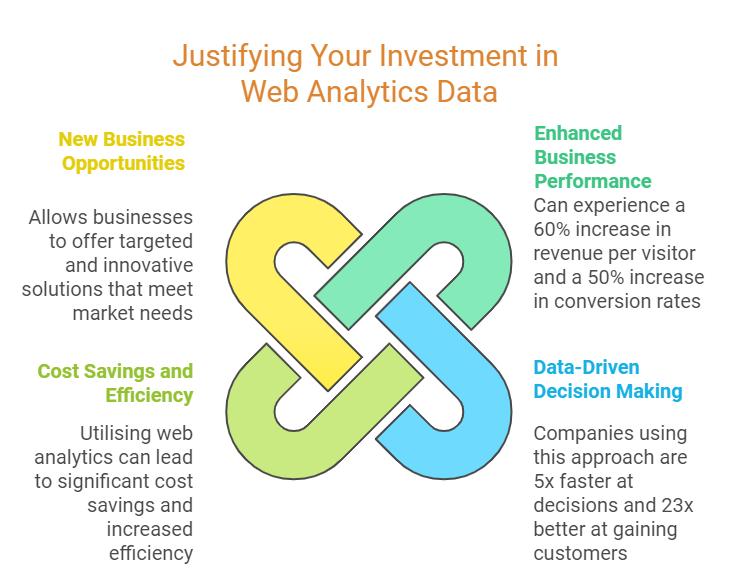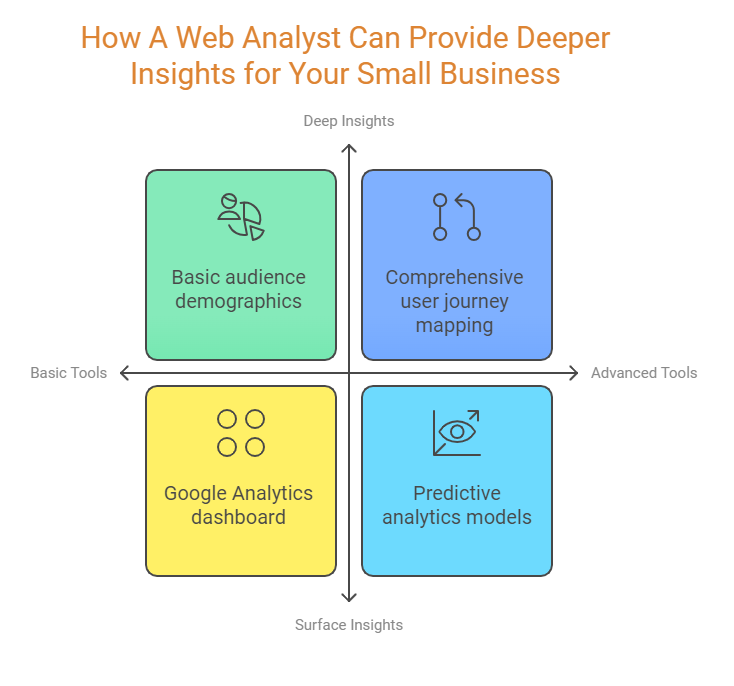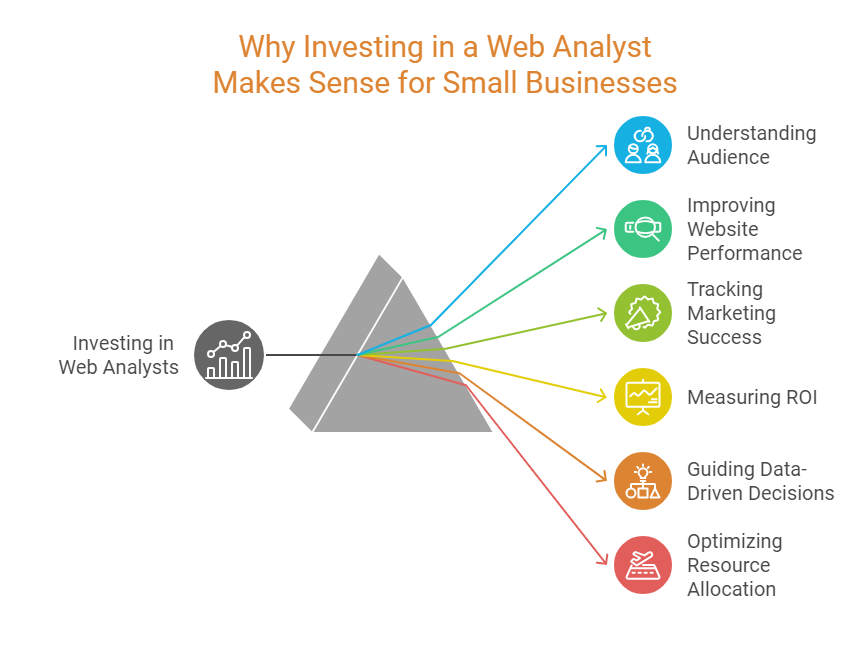# Unlocking the Power of Web Analytics: How Small Businesses Can Supercharge Growth
You’ve got a lovely new website that represents your small business, you’ve posted content all over social media, and maybe you tossed in a few chatbots for good measure (because, why not?). But your sales haven’t really spiked, and you’re left scratching your head wondering why your marketing budget seems to be launching into the void.
What if I told you that the missing ingredient in your recipe for success might just be a solid **web analytics strategy**? Yep, having someone crunch the numbers from your online data can do magic. This blog will explore how small business owners like you can effectively leverage a web analyst to scale operations, improve customer engagement, and boost revenue.
So… let’s dive into the data gold mine!
## What Does a Web Analyst Really Do?
Imagine having a detective right in your business—except instead of hunting down criminals, they track customer behaviors, reveal hidden opportunities, and solve the mystery of why that blog you spent hours on didn’t convert a single lead.
A web analyst gathers and interprets data from user interactions (yes, like how long Sally from Ohio stayed on your “About Us” page) and uses that information to optimize **everything** from marketing to sales funnels.
### Practical Tips for Small Business Owners:
– **Don’t Guess—Track**: Stop hoping your website visitors are converting. Your web analyst can follow their behavior, such as what pages they linger on or where they hit **exit**. Are visitors abandoning carts? That’s prime data to fix the experience and recoup lost sales!
– **Ask for Insights, Not Just Numbers**: Data is awesome, but knowing that 1,000 people visited your site yesterday isn’t useful if you’re unsure what that means for conversion. A good web analyst translates numbers into practical business advice. “Oh, so Saturdays are your high-traffic days? Let’s implement flash sales for better conversions!”
**Fun Analogy**: A web analyst is like a GPS. They give you both the big picture and the exact route to take. You wouldn’t drive cross-country without directions, and you shouldn’t “driverless” your business growth either.
## The Tools Every Small Business (and Their Web Analyst) Need
Here’s the thing: A web analyst isn’t just a number-crunching machine. They need the right tools at their disposal, akin to how a chef needs more than one knife in the kitchen. Sure, bread knives are great, but what about slicing that perfect avocado? (Tasty data, anyone?)
### Key Tools for Truly Insightful Analysis:
– **Google Analytics**: This is the holy grail. Not only does GA help you monitor traffic, but it also tells you a million other things like which promotions are working, where visitors came from, which blog posts got serious engagement—a.k.a. actionable insight central.
– **Google Tag Manager**: Pro Tip from [Neil Patel](https://neilpatel.com/blog/google-tag-manager/)—don’t just settle for traffic numbers alone! **Google Tag Manager** helps analyze specific behaviors on your site, like how many people watched your video or clicked a certain promo banner.
👩🔬 **Pro Tip**: If you think you’re diving too deep, worry not. An experienced web analyst knows exactly how to swim in that ocean of data. They’ll filter out the noise and focus on what’s essential for your bottom line.
**Relatable Anecdote**: Remember that time you tried to use six different tools to figure out why sales dropped, only to give up mid-way? Yeah, web analysts streamline the entire toolkit for you. Let them handle the gadgets while you focus on *doing what you do best*.
## How Can Web Analytics Drive Strategy?
Ah, strategy—the secret sauce that keeps things moving forward. Think of a web analyst like your chess buddy. They know the next smartest **move** on that digital chessboard, and they help you stay ahead of your competition.
### Easy Ways They Boost Your Biz Strategy:
1. **A/B Testing**: Want to know if a new landing page design will convert better but afraid to commit fully? Run a simple A/B test. Your web analyst will compare performance, and voila: you have hard evidence to back up your future design decisions.
🧠 *Statistic Alert*: According to a study by [HubSpot](https://blog.hubspot.com/marketing/ab-testing), businesses that routinely run A/B tests see a 3X higher return on investment from ad campaigns!
2. **User-Centric Design**: Your customers come first, but they won’t tell you directly that they hate your booking form. A web analyst will monitor your bounce rate and pinpoint exactly where users get frustrated—sort of like a “problem-solving ninja.”
**Mini Case Study**: A small bakery in Boston saw a 15% increase in e-commerce sales just by shortening a lengthy checkout process. Their analyst, using data from drop-off points in Google Analytics, noticed high cart abandonment. The easy fix? Fewer form fields = better flow. **Boom**, more croissants sold!
## Don’t Confuse Data With Action (Or Paralysis By Analysis)
There’s a fine line between knowing a lot and acting on what’s important. It’s tempting to get lost in trends, graphs, and metric dashboards, but you’ve gotta focus where it matters.
Here’s Where You Can Start Analyzing TODAY:
– **Identify Your Top Five KPIs**: Key performance indicators could be anything from new leads, sales numbers, or organic reach via SEO. Have your web analyst track these stats religiously.
– **Action Steps, Not Over-analysis**: Rather than diving into every single detail across your 50 pages (overkill, much?), focus on a few **high-value** actions. For example: “Let’s make this newsletter sign-up process smoother.”
🔗 Need guidance on what KPIs to track? This [KISS metrics guide](https://blog.kissmetrics.com/guide-to-key-performance-indicators/) breaks it down quite nicely!
## Common Web Analyst Myths—Busted!
Let’s get something straight, shall we? There are lots of misconceptions floating out there about web analysts. Let’s clear things up:
### Myth #1: “You Need Big Budgets for Web Analysts”
You might assume analytics are only for big companies with fancy tech setups. *False*. Even small businesses can get measurable results from basic (and often free) tools like Google Analytics.
### Myth #2: “Web Analysts Are Just Data Nerds”
Sure, numbers are fun for them (nerdy doesn’t have to be negative), but they’re also sharp communicators! An analyst will explain the data in terms you can use, helping you make sense of the weird chart that looks like abstract art.
**Personal Touch**: “I was once in your shoes, staring at Google Analytics, completely lost. My web analyst translated numbers into revenue-boosting insights, and now I know: it’s not magic, it’s math!”
## Bringing It All Together
All this talk about data may seem overwhelming, but here’s the heart of the matter: **web analytics is your not-so-secret weapon for success**. By focusing on customer behavior, optimizing strategies, and streamlining those marketing dollars, you’re setting your small business on a trajectory for real growth.
### Key Takeaways for You:
– Understand that a web analyst is more than a “number wizard.” They turn data into growth.
– Leverage power-packed analytics tools like Google Analytics and Tag Manager.
– Focus on strategy—A/B test, track valuable KPIs, and optimize based on sound data.
– Don’t fear a little geek speak. It’s there to help you and your brand succeed.
**Your action plan?** Hire or consult a web analyst TODAY, or start auditing your own data with free tools. Your business deserves the best insights—think of it as your personal cheat-code to success.
—
**About the Author:**
With over a decade of experience helping small businesses grow through data-driven marketing strategies, Ali is passionate about turning analytics into actions and geeking out over the latest SEO trends,

